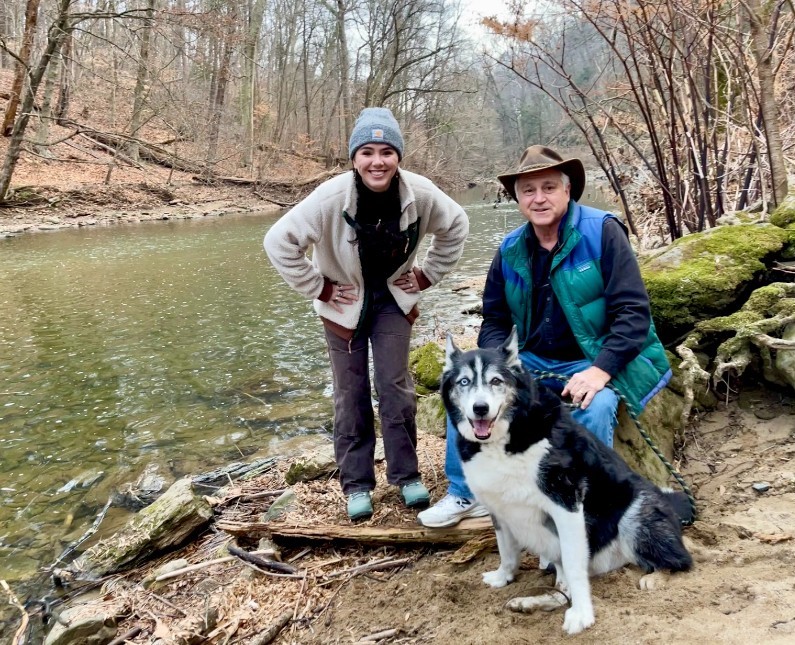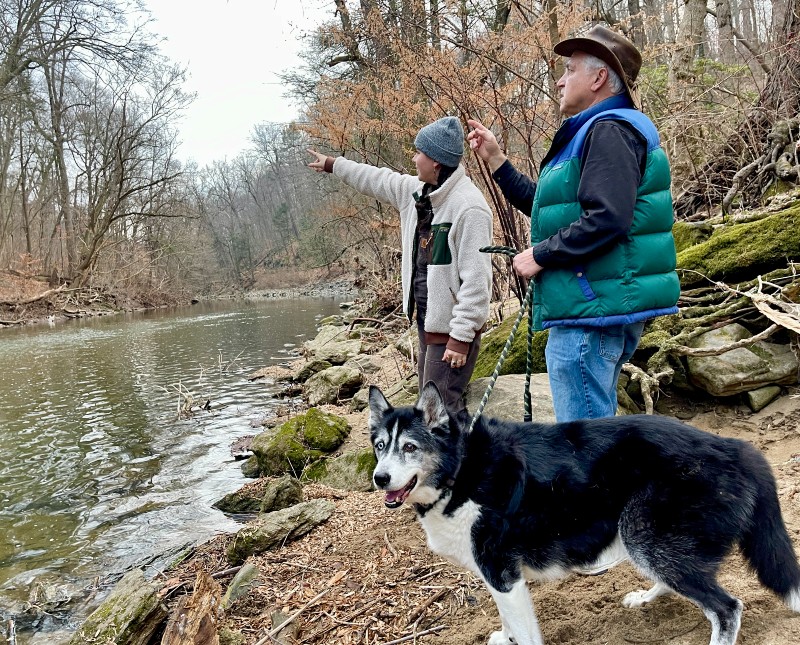Bay Noland-Armstrong, is a student at the University of Georgia focusing on wildlife conservation as well as captain of the Division 1 equestrian team. She aims to graduate with a bachelor’s degree in wildlife sciences and two minors (ecology and in parks, recreation, and tourism management) while additionally achieving her certificate in environmental education. Bay recently did two internships; one at the Smithsonian National Zoo and Conservation Biology Institute in conservation education and another as Loon Ranger for the Montana Fish, Wildlife and Parks Department.
As a young and upcoming conservationist keen to find her way, Bay caught up with William “Bill” Konstant, an Advisory Board member of the Mohamed bin Zayed Species Conservation Fund to learn more about life in conservation.
She met Bill and Blue (Bill’s trusted and loved canine companion) at their favourite spot at Wissahickon Creek in Pennsylvania, to learn more about his book and his work with the Fund.
Bay Noland-Armstrong
I am here with Bill Konstant. He is a renowned wildlife conservationist and the author of his newly released memoir, Wrestles With Wolves.
Bill Konstant
The subtitle of the book, Saving the World One Species at a Time, is Bay’s contribution to the book.
BNA Yeah, so a little backstory on that: My mom always said when I was a kid that I would one day be saving the world one species at a time, as I am a wildlife biology student at the moment, and that is my passion. It’s something that I’m still doing to this day, and I hope to do for the rest of my life.
BNA So I have a couple of questions for you about the new book and just some other fun stuff. Why did you decide to become part of the Mohammed bin Zayed Species Conservation Fund? And what does this organisation mean to you?
BK Well, first, it means a great deal to me because it puts me together with kindred spirits around the world, people who are working on endangered species conservation, from bluebirds to blue whales. We have about a dozen advisors, and that’s what I am. I’m an advisor for mammal projects. That’s my specialty, primates in particular.
BNA Awesome.
BK So it’s an opportunity to see what people are doing in any one of 100 or more different countries around the world, what species they’re working with, and provide them the funds to do their work.
BNA That’s awesome. What a great organisation.
BK It is a wonderful organisation.
BNA So your forward is written by Russ Mittermeier, and I know he’s a longtime friend of yours and a big part of the MBZ Species Conservation Fund. Could you give me a little bit more background about Russ and why you picked him to write your forward specifically?
BK I’ve known Russ for 40 years, exactly this year.
BNA Wow. Wow.
BK Whatever accomplishment I can claim in the field of wildlife conservation, I owe to him and the opportunities that he gave me. I met him when I was a master’s student and an animal trainer, and he was with the World Wildlife Fund at the time, again, working on primates. He was an advisor and a founding board member for the Mohammed bin Zayed Species Conservation Fund. He asked me to come aboard as one of the people who get to make some of the decisions and help people in their careers.
BNA Awesome. What a great relationship. Just a random question, do you have a favourite chapter of the book and why? Mine is ”The Incredible Frog Hotel” just because I love tropical frogs, and I know how endangered some of them are with chytrid and everything, and that’s a very big conservation effort that’s going on in the world today.
BK Okay, I think my favourite chapter, and I’ve given this some thought, is one called “The Voice of Andatu.” It’s about a baby Sumatran rhinoceros and a book that was written by elementary school children here in the United States. They read the story about this first birth in captivity and decided they were going to write a book — the fifth-grade class. I got a chance to work with them to edit a little bit of what they were doing. We had writers, researchers, photo editors and that sort of thing, all within this class. And they produced a book called One Special Rhino that you can go online on Amazon and get. It was picked up by National Geographic Kids magazine, and all the funds from that book go to support rhino conservation. The next class did one on tigers, the one after that on elephants, and the one [after that] on orangutans. In each case, these elementary school kids really made serious contributions to wildlife conservation, and there’s nothing more rewarding than working with children.
BNA That’s such a good way to engage with the youth of today, because not only does it encourage people to go outside, but it encourages kids and students to look into worldwide conservation issues — such an important thing because they’re the futures of all the biologists of the world, so that’s awesome.
BK I mean, I’m long in the tooth, as they would say, and you’re just beginning your wildlife conservation career, so to be able to work with you and youth, this is a special pleasure for me.
BNA What is one piece of advice you have for young people who are pursuing a career in the field of wildlife conservation?
BK Live your dreams. If you dream you can do something and you have a favourite species, I don’t particularly, but some people do, or a group of animals, birds or reptiles or something like that, and you want to do something to help protect them, their populations, be it in your backyard or halfway around the world, don’t follow the old mantra of think globally and act locally. Think globally and act globally, too, if you can. There’s no reason in today’s world why you can’t develop friendships and find colleagues in different parts of the world. And, when you go to college for your degree, which I’m assuming most people will, make the connections that are going to help you with the rest of your life. Subjects are fine. You can study, you can read all the time, but you’re going to come across people, you’re going to cross paths with people who are going to be important to your future, so it’s those connections with people that I would recommend you really nourish.
BNA Okay. Networking.
BK Right. You got that one word. Networking, that’s it.
BNA So who’s the general audience for Wrestles With Wolves?
BK Wildlife enthusiasts, pet owners, zoo goers. It’s got stories for everybody. It’s got stories for younger readers. I don’t know if you would call it a young adult book, but the people who read it, first of all, say they love the photographs of different animals. It’s a memoir, and it’s about lots of different animals, but also about the people that I’ve had an opportunity to work with. I start off by saying I view my life as Mowgli meets Forest Gump— somebody who has a special affinity for animals and nature, but also has, for whatever reason, found numerous opportunities to work with folks all over the world who are doing fantastic work. And, again, that goes right back to the Mohammed bin Zayed Species Conservation Fund.
BNA Well, thank you so much, Bill, for sitting down and talking about conservation.
BK Thank you, Bay. I appreciate the opportunity.
BNA Thank you, Blue.
BK Oh, yeah, Blue. Get your face in here.
BNA We have a little celebrity from the book. This is Mr. Blue.



